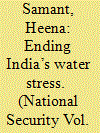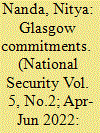|
|
|
Sort Order |
|
|
|
Items / Page
|
|
|
|
|
|
|
| Srl | Item |
| 1 |
ID:
186238


|
|
|
|
|
| Summary/Abstract |
India is facing water distress in both quality and quantity. This is expected to worsen if urgent all-round remedial measures being taken prove to be inadequate. Water shortages, pollution, overuse and significant wastage, low to no water pricing, floods in monsoon when water is abundant, among others, characterise the prevailing situation in parts of the country. Several factors, such as exponential population growth, rapid urbanisation, industrialisation, antiquated infrastructure, and inadequate water governance, can be credited for this plight. There are major reforms and changes underway that raise hopes for a more secure future. The Government has made ‘water governance’ one of the main priorities in its policies and decisions, and significant advances in overcoming water related challenges are being made. Despite these measures, a crisis could still be inevitable due to the challenges posed by climate change. India needs to make its people conscious of the finite nature of water and the utmost need to avoid waste and overuse. They need to learn to nurture, conserve, reuse, and recycle this invaluable resource of nature.
|
|
|
|
|
|
|
|
|
|
|
|
|
|
|
|
| 2 |
ID:
186236


|
|
|
|
|
| Summary/Abstract |
India made ambitious commitments on climate mitigation in its first Nationally Determined Contribution (NDC) in 2015 and upgraded it further at the Glasgow summit in 2021. Additionally, it made a commitment to achieve a net-zero emission level by 2070. While some of the NDC commitments may be difficult to realise, particularly due to the current economic situation, it is difficult to comment on the feasibility of the net-zero emission by 2070 as the basis for such a commitment is not known, and it is a long-time horizon, making any prediction difficult. For India, living up to its commitment will not only be determined by its own internal factors and challenges but also by how other major countries perform on their mitigation commitments. Similarly, the implications of the Glasgow summit will not be determined by its own commitments, but the commitments made by others and their follow-up actions.
|
|
|
|
|
|
|
|
|
|
|
|
|
|
|
|
| 3 |
ID:
186237


|
|
|
|
|
| Summary/Abstract |
In India, solar and wind have emerged as key components of the country’s strategy for a clean energy future. Although hydropower has historically been the main source of clean and renewable energy in the country, it currently lags solar and wind in terms of deployment. Nonetheless, hydropower has a critical role in hastening India’s clean energy transition and climate change mitigation efforts. Hydropower’s ability to integrate large shares of variable and intermittent renewable energy sources, such as solar and wind, in the country’s electricity system is increasingly important as their penetrations increase. Hydropower installations also provide crucial services like water supply, irrigation, flood protection, and drought mitigation, navigation, tourism, and recreation. Beyond ths, it also serves strategic purposes. By alleviating the socio-economic conditions of border villages and communities in the India-Tibetan border regions such as Arunachal Pradesh, hydropower projects can help India consolidate its administration in the remote border regions, and strengthen its security and defence preparedness. However, such projects are inherently challenging and can have adverse environmental and social impacts. But these can be mitigated by adopting new social and environmental safeguards and more robust and cost-effective technological solutions.
|
|
|
|
|
|
|
|
|
|
|
|
|
|
|
|
| 4 |
ID:
186234


|
|
|
| 5 |
ID:
186233


|
|
|
| 6 |
ID:
186239


|
|
|
|
|
| Summary/Abstract |
The security situation in the West African state of Mali started to deteriorate in 2011 when the separatist group MNLA and Islamists took control of the country’s north and imposed Shariah. Since 2013, France has been the principal security provider against Islamist militants, though US, EU and ECOWAS have also been supporting the Malian national forces. The civilian regime, however, faced growing internal opposition and popular protests, and this led to two back-to back coups by the military in the past two years. Immediately after the second coup in 2021, France decided to pull out its troops from Mali. While many scholars hold climate change responsible for the increasing conflicts in the region, there is little evidence to prove this. Instead, the problem is rooted in the weakness of the State to govern, exercise sovereignty over the entire territory, and provide adequate security to the people. This has led to dependence on external powers. With a heterogeneous mix of Islamists, separatists and ethnic militias fighting both the civilian and military regimes, Mali has become a tinderbox and can explode at any time. Unless France and the international community recalibrate their relationship with Mali, we could witness a repeat of an Afghanistan-like collapse.
|
|
|
|
|
|
|
|
|
|
|
|
|
|
|
|
| 7 |
ID:
186235


|
|
|
|
|
| Summary/Abstract |
The Classical and Neo-classical mechanistic economic development models believed in the unlimited supply of natural resources and unlimited economic growth. The practice of these models since the 18 th century has resulted in severe depletion of resources and the degradation of society and the environment. Sustainable development has become the new global slogan for solving the above problems. Protection of the environment while promoting development is the crux of Sustainable Development. It is inclusive of the satisfaction of the needs of the present as well as the future generations. Scientific research, technological innovations, government policies and economic programmes are being adopted to achieve sustainable development at the national and international levels. But the success rate is limited. Scientists are now thinking of a paradigm shift by incorporating religious, cultural, and spiritual traditions and values. India has a rich tradition in environmental protection and development, thanks to her holistic vision and integrated approach realized through the Advaitha principle of Vedanta Philosophy. She could be the torchbearer in the global efforts to achieve sustainable development.
|
|
|
|
|
|
|
|
|
|
|
|
|
|
|
|
|
|
|
|
|